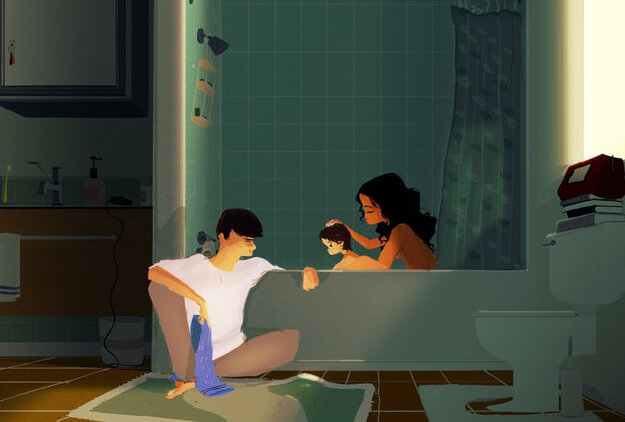I Teach My Child To Call Things As They Are


Written and verified by the psychologist Valeria Sabater
Teaching our children to call things as they are, by their name, has both pedagogical and essential psychological importance.
For example, children who know what each part of their body is called, can construct their identity earlier than those who don’t.
This knowledge allows them to defend themselves against possible abuse and promotes adequate attitudes towards self-care.
This topic can undoubtedly be very sensitive for many, however it’s important for us to put it on the table. Words are indispensable tools that are used to construct our reality.
If something doesn’t have a name, it simply “does not exist.” We can see this kind of behavior in some children.
There are little boys and girls who are taught as though their sexual organs don’t exist. “Don’t look at that, don’t touch that.”
The word “that” is too imprecise and conveys the idea that it’s something strange and prohibited; something they shouldn’t talk about and something that is shameful.
Many of these girls and boys can come to perceive their genitals as something that isn’t an integral part of their body. This in turn can make them more vulnerable to abuse.
It can also make them believe that “they have something shameful inside of them,” something that should not be named.
Educating them this way is neither healthy nor pedagogical. It’s time for us to leave behind fear and taboo in order to guide or children truthfully and responsibly.
Here at “YouAreMom” we invite you to reflect on this topic.
Calling things by their name, without taboos

A nose is a nose, a hand is a hand… Calling things by their name and explaining certain things to your children will help them in their development and self-care.
There is nothing wrong, for example, in explaining to them that their sexual organs shouldn’t be touched with dirty hands.
It’s also important to make clear to them that nobody can nor should touch these areas of their body.
If anybody does so without their permission or if something makes them uncomfortable or “feel bad” they should run, ask for help and speak to mom and dad about it right away.
Speaking about these things openly and without taboos will help them adopt good hygiene. It will also make them feel safe in asking and telling us things without fear or shame.
This will also ensure that we, as parents, will always be the first point of reference when they reach puberty and have more concrete doubts, worries and fears…
A lot of parents already know that around the age of 3-4, children start to develop clarity about their gender identity. This is when they become interested in the differences between boys and girls.
This is also when we should be attentive. We should respond to their fears with clarity while always being sensitive to their worries and doubts.
Things have names and emotions as well
Teaching our children to call things by their names also promotes their ability to correctly identify their emotions. They will be able to put into words what they feel, need, what they think and what worries them.
- Emotions and their expressions are not taboo and we should make that very clear when it comes to educating them.
- Something that occurs frequently is that boys are told that “boys don’t cry” and “boys have to be strong.” Little by little and almost without knowing it, we mold them into people who are incapable of expressing certain feelings. They begin to shake off their fears and hide their needs.
Fear exists, anger has a shape and sadness has a name. Therefore, it is important to help our children say “I am scared because at school there is a child that wants to hit me.”
This can allow us to help them early on, which will in turn prevent many problems. This way, we’ll raise boys and girls who are emotionally intelligent.
Educate intelligently, educate without taboos

As a mother or father it’s important for your children to trust in you. They shouldn’t be afraid of anything. They should develop good self-esteem, a good identity and an authentic capacity to be happy with who they are.
In order to achieve this, there is nothing better than teaching them from an early age to call things as they are. If there are no taboos, there will be nothing left in the shadows, allowing the child to feel safe.
It’s also important to remember not to “skip steps.” There is no need to explain to a 3-year-old child where babies come from. Everything should be done in its due time.
However, if your child asks you that question, try not to lie or come up with strange metaphors. We shouldn’t forget that our children have a lot of access to new technology. Sometimes they can find out the answers by themselves.
That’s why it’s important for us to be their primary guide. The one who gives them the best answer to their questions.
Teaching our children to call things as they are, by their name, has both pedagogical and essential psychological importance.
For example, children who know what each part of their body is called, can construct their identity earlier than those who don’t.
This knowledge allows them to defend themselves against possible abuse and promotes adequate attitudes towards self-care.
This topic can undoubtedly be very sensitive for many, however it’s important for us to put it on the table. Words are indispensable tools that are used to construct our reality.
If something doesn’t have a name, it simply “does not exist.” We can see this kind of behavior in some children.
There are little boys and girls who are taught as though their sexual organs don’t exist. “Don’t look at that, don’t touch that.”
The word “that” is too imprecise and conveys the idea that it’s something strange and prohibited; something they shouldn’t talk about and something that is shameful.
Many of these girls and boys can come to perceive their genitals as something that isn’t an integral part of their body. This in turn can make them more vulnerable to abuse.
It can also make them believe that “they have something shameful inside of them,” something that should not be named.
Educating them this way is neither healthy nor pedagogical. It’s time for us to leave behind fear and taboo in order to guide or children truthfully and responsibly.
Here at “YouAreMom” we invite you to reflect on this topic.
Calling things by their name, without taboos

A nose is a nose, a hand is a hand… Calling things by their name and explaining certain things to your children will help them in their development and self-care.
There is nothing wrong, for example, in explaining to them that their sexual organs shouldn’t be touched with dirty hands.
It’s also important to make clear to them that nobody can nor should touch these areas of their body.
If anybody does so without their permission or if something makes them uncomfortable or “feel bad” they should run, ask for help and speak to mom and dad about it right away.
Speaking about these things openly and without taboos will help them adopt good hygiene. It will also make them feel safe in asking and telling us things without fear or shame.
This will also ensure that we, as parents, will always be the first point of reference when they reach puberty and have more concrete doubts, worries and fears…
A lot of parents already know that around the age of 3-4, children start to develop clarity about their gender identity. This is when they become interested in the differences between boys and girls.
This is also when we should be attentive. We should respond to their fears with clarity while always being sensitive to their worries and doubts.
Things have names and emotions as well
Teaching our children to call things by their names also promotes their ability to correctly identify their emotions. They will be able to put into words what they feel, need, what they think and what worries them.
- Emotions and their expressions are not taboo and we should make that very clear when it comes to educating them.
- Something that occurs frequently is that boys are told that “boys don’t cry” and “boys have to be strong.” Little by little and almost without knowing it, we mold them into people who are incapable of expressing certain feelings. They begin to shake off their fears and hide their needs.
Fear exists, anger has a shape and sadness has a name. Therefore, it is important to help our children say “I am scared because at school there is a child that wants to hit me.”
This can allow us to help them early on, which will in turn prevent many problems. This way, we’ll raise boys and girls who are emotionally intelligent.
Educate intelligently, educate without taboos

As a mother or father it’s important for your children to trust in you. They shouldn’t be afraid of anything. They should develop good self-esteem, a good identity and an authentic capacity to be happy with who they are.
In order to achieve this, there is nothing better than teaching them from an early age to call things as they are. If there are no taboos, there will be nothing left in the shadows, allowing the child to feel safe.
It’s also important to remember not to “skip steps.” There is no need to explain to a 3-year-old child where babies come from. Everything should be done in its due time.
However, if your child asks you that question, try not to lie or come up with strange metaphors. We shouldn’t forget that our children have a lot of access to new technology. Sometimes they can find out the answers by themselves.
That’s why it’s important for us to be their primary guide. The one who gives them the best answer to their questions.
This text is provided for informational purposes only and does not replace consultation with a professional. If in doubt, consult your specialist.








